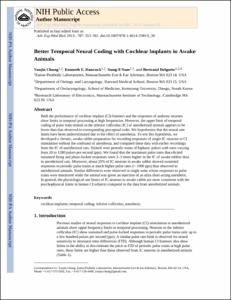KUMEL Repository
1. Journal Papers (연구논문)
1. School of Medicine (의과대학)
Dept. of Otorhinolaryngology (이비인후과학)
Better Temporal Neural Coding with Cochlear Implants in Awake Animals
- Keimyung Author(s)
- Nam, Sung Il
- Department
- Dept. of Otorhinolaryngology (이비인후과학)
- Journal Title
- Advances in Experimentral Medicine and Biology
- Issued Date
- 2013
- Volume
- 787
- Abstract
- Both the performance of cochlear implant (CI) listeners and the responses of auditory neurons
show limits in temporal processing at high frequencies. However, the upper limit of temporal
coding of pulse train stimuli in the inferior colliculus (IC) of anesthetized animals appears to be
lower than that observed in corresponding perceptual tasks. We hypothesize that the neural rate
limits have been underestimated due to the effect of anesthesia. To test this hypothesis, we
developed a chronic, awake rabbit preparation for recording responses of single IC neurons to CI
stimulation without the confound of anesthesia, and compared these data with earlier recordings
from the IC of anesthetized cats. Stimuli were periodic trains of biphasic pulses with rates varying
from 20 to 1280 pulses per second (pps). We found that the maximum pulse rates that elicited
sustained firing and phase-locked responses were 2–3 times higher in the IC of awake rabbits than
in anesthetized cats. Moreover, about 25% of IC neurons in awake rabbit showed sustained
responses to periodic pulse trains at much higher pulse rates (> 1000 pps) than observed in
anesthetized animals. Similar differences were observed in single units whose responses to pulse
trains were monitored while the animal was given an injection of an ultra short-acting anesthetic.
In general, the physiological rate limits of IC neurons in awake rabbit are more consistent with the
psychophysical limits in human CI subjects compared to the data from anesthetized animals.
Keywords
cochlear implants; temporal coding; inferior colliculus; anesthesia
- Keimyung Author(s)(Kor)
- 남성일
- Publisher
- School of Medicine
- Citation
- Yoojin Chung et al. (2013). Better Temporal Neural Coding with Cochlear Implants in Awake Animals. Advances in Experimentral Medicine and Biology, 787, 353–361. doi: 10.1007/978-1-4614-1590-9_39
- Type
- Article
- ISSN
- 0065-2598
- Appears in Collections:
- 1. School of Medicine (의과대학) > Dept. of Otorhinolaryngology (이비인후과학)
- 파일 목록
-
-
Download
 oak-aaa-00094.pdf
기타 데이터 / 1.72 MB / Adobe PDF
oak-aaa-00094.pdf
기타 데이터 / 1.72 MB / Adobe PDF
-
Items in Repository are protected by copyright, with all rights reserved, unless otherwise indicated.